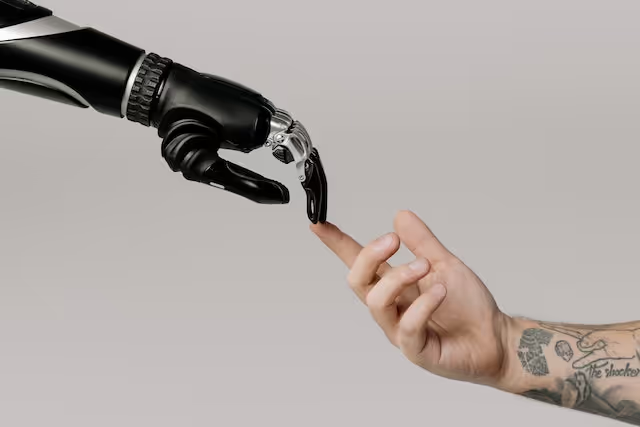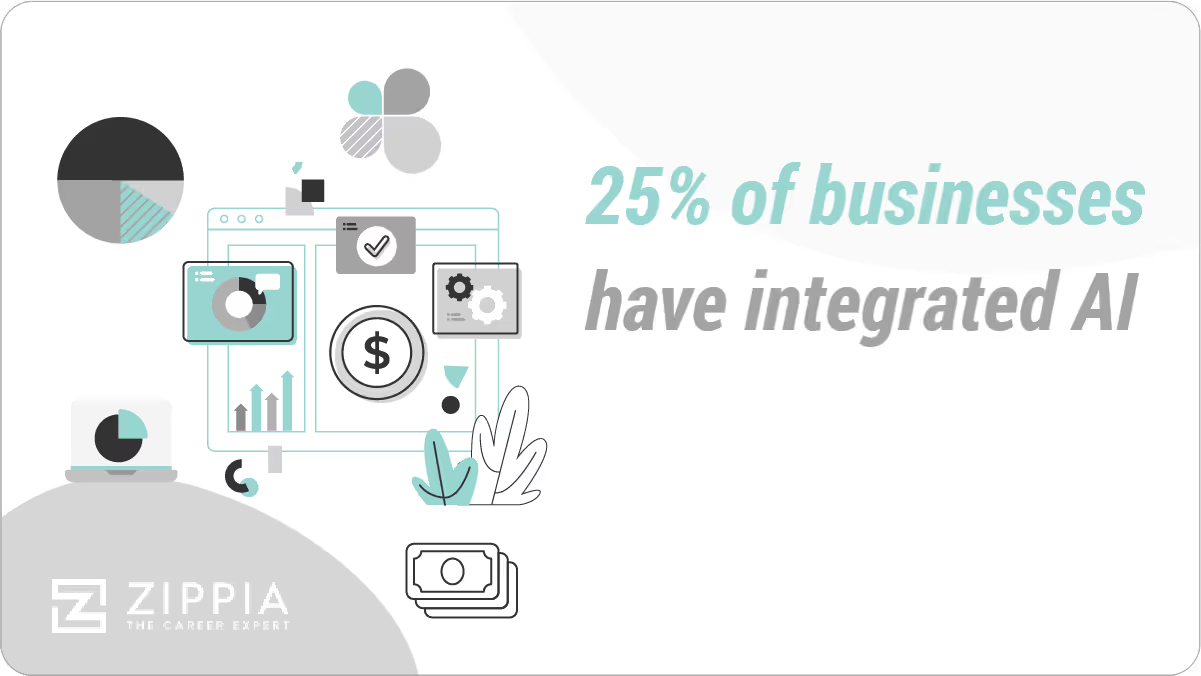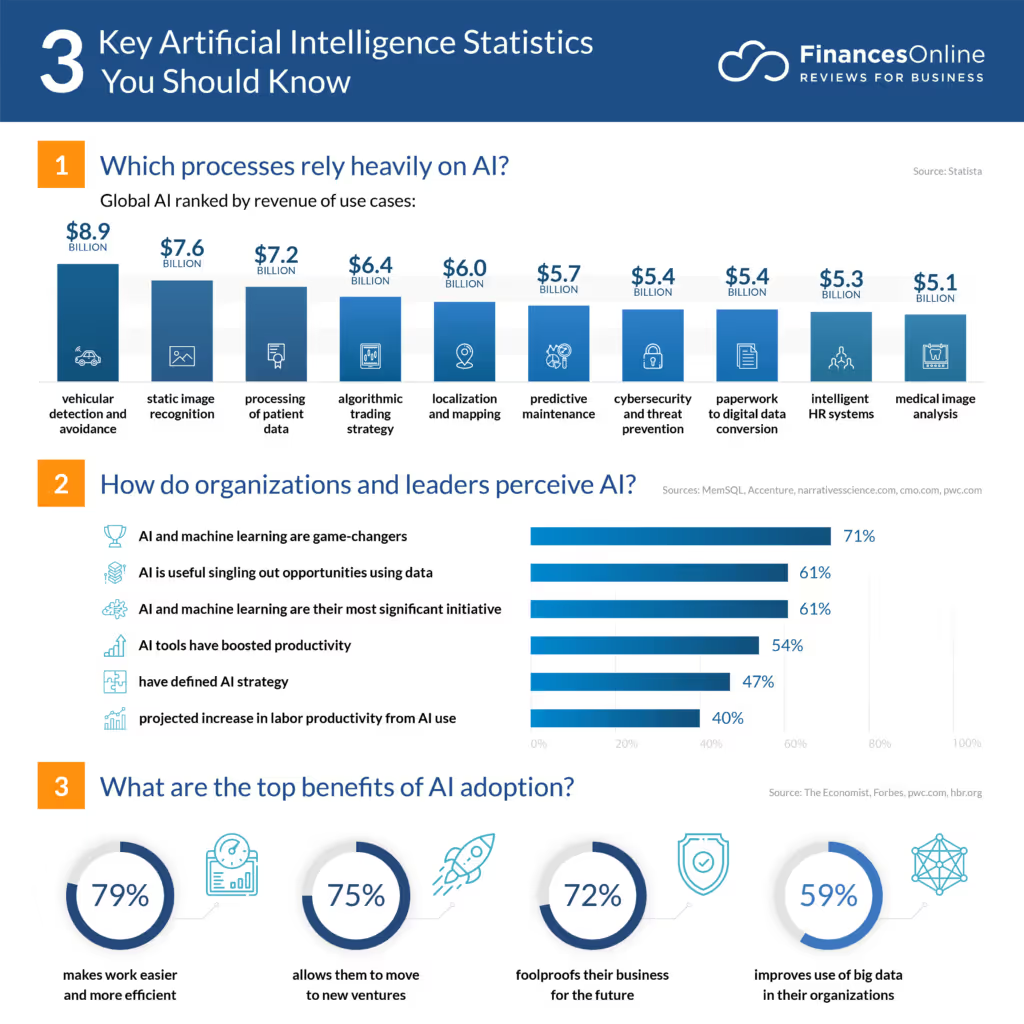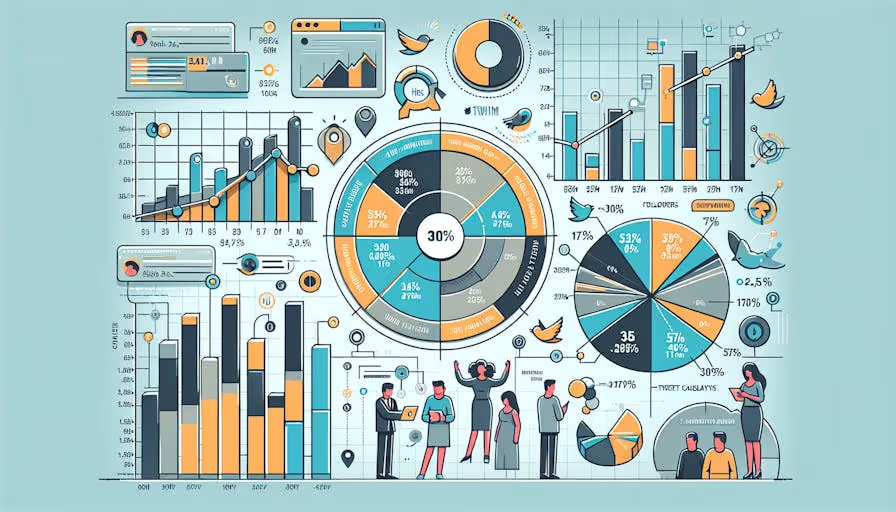Artificial Intelligence Statistics & Facts For 2023
New AI statistics show that 35% of companies are using AI and 42% of companies are exploring AI for its implementation in the future.

Artificial Intelligence Statistics
Artificial Intelligence (AI) is no longer a futuristic concept. It has become a reality and is transforming the way we live and work.
From self-driving cars to voice assistants like Siri and Alexa, AI has made its way into our daily lives.
In this article, we will explore some of the most interesting statistics about AI and its current landscape.

How Many Companies Use AI?
Nowadays, 77% of businesses are using or exploring AI. Among them, 35% of companies are using AI and 42% of companies are exploring AI for its implementation in the future.
Artificial Intelligence Facts and Statistics
To get a better understanding of the current AI landscape, let's take a look at some interesting facts and statistics:
- 35% of companies are using AI and 42% of companies are exploring AI for its implementation in the future.
- According to a report by Gartner, the global AI market is expected to reach $266.92 billion by 2027.
- In 2020, there were over 10 million active installations of voice assistants in the United States alone.
- A study by McKinsey & Company found that AI could potentially contribute $13 trillion to the global economy by 2030.
- The healthcare industry is one of the biggest adopters of AI technology, with an estimated market size of $6.6 billion in 2021.
- By 2030, it's predicted that up to 30% of jobs will be automated through the use of AI technology.
- The global market size for AI in the education industry is predicted to reach $3.68 billion by 2023.
- According to a survey by MIT Technology Review, 81% of executives believe that AI will be a major competitive advantage for their business.
- By 2024, it's predicted that the global chatbot market will be worth $9.4 billion.
- The use of AI in customer service can result in cost savings of up to 30%.
- In the finance industry, AI-powered chatbots are projected to save banks $7.3 billion by 2023.
- A study by PwC found that AI could contribute up to $15.7 trillion to the global economy by 2030.
- In Japan, there are hotels entirely staffed by robots and run using AI technology.
- The global market size for autonomous vehicles is expected to reach $556.67 billion by 2026.
- By 2025, it's estimated that the number of IoT devices worldwide will reach 75.44 billion, all of which generate data that can be analyzed with AI algorithms.
These statistics demonstrate just how significant AI has become in our society and how it's poised to continue growing in importance in various industries.

AI Adoption Statistics
More and more companies are taking advantage of artificial intelligence. Let's have a look at more detailed statistics:
- Large companies are twice as likely to use AI than small companies.
- Chinese and Indian companies have the highest levels of AI adoption at nearly 60%.
- 15% of enterprises are using AI. 31% of them say that it's their agenda for the next 12 months.
- The number of AI startups since 2000 has increased 14 times.
AI Adoption Use Cases By Industry
- In the retail industry, AI-powered personalized product recommendations have been shown to increase sales by up to 30%.
- According to a report by Accenture, implementing AI in manufacturing could increase labor productivity in China alone by up to 27%.
- By analyzing large amounts of data from patients' medical records and other sources, AI algorithms can help doctors diagnose diseases more accurately and develop more effective treatments.
- In agriculture, drones equipped with sensors and cameras powered by AI technology can monitor crops and soil conditions more efficiently than humans can.
- A study published in Nature Communications found that an AI algorithm was able to predict earthquakes with greater accuracy than traditional methods.
- In the energy sector, using machine learning algorithms on data generated from wind turbines has been shown to increase energy production efficiency by up to 20%.
- According to a report from MarketsandMarkets, the global market for natural language processing (NLP) technology is expected to reach $35.1 billion by 2026.
- In the insurance industry, using predictive analytics powered by machine learning algorithms can help insurers detect fraudulent claims more quickly and accurately than traditional methods.
- By analyzing social media data using sentiment analysis algorithms powered by AI technology, companies can gain insights into customer preferences and improve their marketing strategies accordingly.
- The use of computer vision algorithms powered by artificial neural networks has enabled significant advances in image recognition tasks such as object detection and facial recognition.
The Growth of AI
The growth of AI has been exponential in recent years. According to a report by Tractica, the global AI market is expected to grow from $9.5 billion in 2018 to $118.6 billion by 2025.
This represents a compound annual growth rate (CAGR) of 36.6%. The report also highlights that the adoption of AI is increasing across various industries, including healthcare, finance, and retail.
AI Market Size Growth Predictions
The AI Software Market's Global Annual Revenue (2018-2025)
Year-Over-Year Growth
The Impact of AI on Jobs
One of the biggest concerns about AI is its impact on jobs. While some jobs may be automated, AI is also creating new job opportunities. According to a report by Gartner, AI will create 2.3 million jobs by 2020, while eliminating 1.8 million jobs.
This means that there will be a net increase of 500,000 jobs. The report also highlights that the jobs created by AI will require new skills, such as data analysis and programming.
The Role of AI in Healthcare
AI has the potential to revolutionize healthcare. It can help doctors diagnose diseases, develop personalized treatment plans, and even predict outbreaks.
According to a report by Accenture, the AI healthcare market is expected to grow at a CAGR of 40% from 2017 to 2021. The report also highlights that AI has the potential to save the healthcare industry $150 billion annually by 2026.
The State of AI in Business
AI is transforming the way businesses operate. It's no surprise that companies are embracing AI to gain a competitive advantage, reduce costs, and improve efficiency.
According to a report by Grand View Research, the global AI market in the business sector is expected to reach $25.7 billion by 2025, with a CAGR of 52% from 2019 to 2025.
One of the most significant impacts of AI on business is its ability to automate repetitive tasks. This can help companies save time and money while increasing accuracy and reducing errors.
For example, AI-powered chatbots can handle customer inquiries and support requests without human intervention.
Another area where AI is making an impact is in data analysis. With the amount of data generated by businesses increasing exponentially, it's becoming harder for humans to analyze it all effectively.
AI algorithms can quickly sift through vast amounts of data and identify patterns that humans might miss. This can help businesses make better-informed decisions and gain insights into customer behavior.
AI also has the potential to transform supply chain management. By using predictive analytics powered by machine learning algorithms, companies can forecast demand more accurately, optimize inventory levels, and improve shipping times.
Overall, the state of AI in business is rapidly evolving. As technology continues to advance, we can expect more companies to embrace AI as a way to stay ahead of competitors and drive growth.
Machine Learning and AI Stats
Machine learning is a subset of AI that involves training algorithms to make predictions or decisions based on data. Here are some interesting statistics about machine learning and its impact on AI:
- According to a report by IBM, 90% of the world's data has been created in the last two years, and machine learning is essential for analyzing this vast volume of data.
- The global market for machine learning technology is expected to grow from $1.4 billion in 2017 to $8.8 billion by 2022, according to MarketsandMarkets.
- Machine learning algorithms are being used to improve fraud detection in the finance industry. A study by PwC found that machine learning can detect up to 99% of fraudulent transactions.
- In the healthcare industry, machine learning algorithms are helping doctors develop personalized treatment plans for patients. By analyzing large amounts of patient data, these algorithms can identify patterns and predict which treatments will be most effective.
- Machine learning is also being used in the transportation industry to improve safety and efficiency. For example, self-driving cars use machine learning algorithms to recognize objects on the road and make decisions about how to respond.
- In the field of natural language processing (NLP), machine learning algorithms are used to analyze text data and generate insights into customer sentiment or preferences. This information can be used by businesses to improve their products or services.
These statistics demonstrate how important machine learning has become in enabling AI applications across various industries. As more companies invest in this technology, we can expect even more significant advances in AI capabilities in the future.
Impact of AI on Jobs and Employment Market
As AI continues to evolve, there is a growing concern about its impact on the job market. While some jobs may be automated, AI is also creating new job opportunities.
According to a report by the World Economic Forum, 75 million jobs are expected to be displaced by 2022 in 20 major economies due to automation. However, the same report also predicts that 133 million new jobs will be created as a result of technological advances.
AI is expected to have a significant impact on certain industries such as manufacturing, transportation, and customer service. For example, autonomous vehicles could displace millions of drivers in the coming years.
At the same time, they will create new job opportunities for software developers and engineers who design and maintain these vehicles.
AI has also been shown to increase productivity and efficiency in various industries.
This can lead to cost savings for companies and potentially higher wages for workers who possess skills required to operate or manage AI systems.
In addition, AI has created new job categories such as data scientists, machine learning engineers, and robot coordinators. These roles require specialized skills that were not previously in demand.
Overall, while there may be some displacement of jobs due to automation enabled by AI technology, it's important to recognize that it can also create new opportunities and drive economic growth in various industries. It's crucial for workers and businesses alike to invest in developing new skills necessary for the future workforce.
AI Market Statistics
The AI market is booming, and the numbers speak for themselves. According to a report by MarketsandMarkets, the global AI market size was valued at USD 62.35 billion in 2020 and is expected to reach USD 309.6 billion by 2026, growing at a CAGR of 40.1% during the forecast period.
The growth of the AI market can be attributed to several factors, including the increasing adoption of cloud-based applications and services, advancements in big data analytics, and the rising demand for intelligent virtual assistants.
Additionally, the proliferation of IoT devices has created vast amounts of data that can be analyzed with AI algorithms, leading to increased demand for machine learning and deep learning technologies.
The report also highlights that North America is expected to dominate the AI market during the forecast period, due to its large number of tech companies and robust research and development activities.
However, Asia Pacific is expected to grow at the highest CAGR during this period due to increasing government initiatives and investments in developing countries such as China and India.
Overall, these statistics show that the AI market is rapidly expanding across various industries worldwide. As more businesses continue to adopt AI technology into their operations, we can expect even greater growth in this field in the coming years.
The Future of AI
The future of AI is exciting and full of possibilities. According to a report by PwC, AI has the potential to contribute $15.7 trillion to the global economy by 2030. The report also highlights that AI will create new products and services, improve efficiency, and enhance customer experiences.
AI in Customer Service
AI is revolutionizing the customer service experience. With the use of AI-powered chatbots, companies can provide 24/7 customer support without the need for human intervention.
These chatbots can handle a wide range of inquiries and support requests, such as tracking orders, resetting passwords, and answering frequently asked questions.
The benefits of using AI in customer service go beyond just cost savings. Customers can receive instant responses to their queries without having to wait on hold or navigate through complex phone menus. This leads to increased satisfaction and loyalty.
Moreover, AI algorithms can analyze customer interactions with chatbots to identify patterns and improve response times and accuracy. This data can also be used by businesses to gain insights into customer behavior and preferences.
According to a report by Juniper Research, the adoption of AI in customer service is expected to save businesses over $11 billion annually by 2023. As more companies continue to embrace this technology, we can expect even greater advances in the field of AI-powered customer service in the near future.
AI in Marketing
AI is revolutionizing the marketing industry by enabling businesses to personalize their marketing efforts and improve customer engagement.
With the help of AI-powered algorithms, businesses can analyze vast amounts of data to gain insights into customer behavior and preferences. This information can be used to create targeted marketing campaigns that resonate with customers and drive sales.
One area where AI is making a significant impact is in personalized product recommendations.
By analyzing customer data, such as past purchases and browsing history, AI algorithms can suggest products that are highly relevant to individual customers. This leads to increased sales and customer satisfaction.
Another way that AI is being used in marketing is through chatbots. Chatbots powered by AI technology can handle customer inquiries, provide support, and even make purchases on behalf of customers. This leads to improved efficiency and faster response times.
Moreover, AI algorithms can analyze social media data to gain insights into customer sentiment and preferences. This information can be used by businesses to tailor their marketing strategies accordingly and improve their overall brand reputation.
According to a report by MarketsandMarkets, the global market for AI in marketing is expected to reach USD 26.7 billion by 2022, growing at a CAGR of 29.7% during the forecast period.
As more companies continue to embrace this technology, we can expect even greater advances in the field of AI-powered marketing in the near future.
What Is AI?
AI, or artificial intelligence, refers to the ability of machines to perform tasks that typically require human intelligence. This can include things like speech recognition, decision-making, and even creativity.
AI is made possible through the use of algorithms and machine learning techniques that enable computers to learn from data and make predictions or decisions based on that data.
The ultimate goal of AI is to create machines that can think and reason like humans, with the ability to adapt to new situations and solve complex problems in ways that were previously thought impossible.
What Are the Three Types of AI?
When it comes to AI, there are generally three types: narrow or weak AI, general or strong AI, and superintelligence. Narrow AI is the most common type of AI we see today.
It is designed to perform a specific task, such as facial recognition or language translation. General AI is more advanced and can be trained to perform multiple tasks, similar to how humans learn and adapt. Finally, superintelligence refers to an AI that surpasses human intelligence in all areas and is capable of self-improvement.
While the development of superintelligence is still a long way off, experts believe it could have significant implications for society and raise ethical concerns about its control and safety.
Where is AI Used Today?
AI is used in a variety of industries today, including healthcare, finance, retail, transportation, and manufacturing.
In healthcare, AI algorithms are used to analyze large amounts of medical data to help doctors make more accurate diagnoses and develop personalized treatment plans for patients. In finance, machine learning algorithms are used to detect fraudulent transactions and improve risk management.
In retail, AI-powered chatbots and personalized product recommendations are used to improve customer experiences and increase sales. In transportation, self-driving cars use AI algorithms to recognize objects on the road and make decisions about how to respond.
And in manufacturing, predictive analytics powered by machine learning algorithms can optimize supply chain management and reduce downtime in production lines.
As AI technology continues to evolve and become more advanced, we can expect even greater adoption of this technology across various industries in the future.
What is the Future of AI?
The future of AI is promising, with many exciting possibilities on the horizon. As technology continues to evolve, we can expect AI to become even more advanced and integrated into our daily lives.
One area where we can expect significant growth in the future is in the development of autonomous systems. With the increasing adoption of self-driving cars and drones, AI-powered autonomous systems are poised to revolutionize transportation and logistics.
These systems will be able to navigate complex environments and make decisions in real-time, leading to increased efficiency and safety.
Another area where we can expect significant growth is in the field of natural language processing (NLP). NLP technology enables machines to understand human language and respond accordingly.
This has already led to the development of voice assistants like Siri and Alexa, but there is still much room for growth in this field. In the future, we may see even more advanced NLP systems that can understand context and respond with greater accuracy.
AI also has the potential to transform education by providing personalized learning experiences for students.
By analyzing data on student performance, AI algorithms can identify areas where students need additional support and provide tailored recommendations for improvement.
Moreover, AI has shown promise in improving sustainability efforts by optimizing energy consumption and reducing waste. For example, machine learning algorithms can analyze data from smart meters to identify patterns of energy usage and make recommendations for more efficient use.
Overall, the future of AI is bright with endless possibilities for innovation across various industries.
As technology continues to advance at a rapid pace, it's important for businesses and individuals alike to stay up-to-date with developments in this field so they can take advantage of its benefits while mitigating potential risks.
Conclusion
AI is transforming the world we live in. Its growth is exponential, and its impact is significant. While there are concerns about its impact on jobs, AI is also creating new job opportunities.
In healthcare, AI has the potential to save lives and improve patient outcomes. The future of AI is exciting, and we can expect it to continue to transform the way we live and work.
Sources
- https://www.simplilearn.com/artificial-intelligence-stats-article
- https://connect.comptia.org/blog/artificial-intelligence-statistics-facts
- https://techjury.net/blog/ai-statistics/
- https://explodingtopics.com/blog/ai-statistics
- https://dataprot.net/statistics/ai-statistics/
- https://type.ai/blog/what-is-artificial-intelligence
- https://www.zippia.com/advice/artificial-intelligence-statistics/
Recent News
Related articles
.avif)
100+ YouTube Statistics, Facts & Demographics
In 2023, YouTube has over 2.5 billion monthly active users.

39 Teacher Statistics And Demographics
Find the most up-to-date teacher demographics and statistics that'll surprise you.

Twitter Statistics for Social Media Enthusiasts [2024]
Explore compelling twitter statistics, user demographics, content engagement, and future predictions.
.avif)
89 TikTok Statistics, Facts & User Demographics
New TikTok statistics show that TikTok has quickly become one of the most popular social media platforms, with users spending an average of 52 minutes per day scrolling through videos.

Key Tinder Statistics You Need to Know
Dive into the world of Tinder statistics - revealing insights on user demographics, engagement, and global trends.
.avif)
49 Telehealth Statistics & Telemedicine Trends
Telehealth statistics show that the use of virtual care is 38 times higher than before the COVID-19 pandemic.

Teacher Salary By State: Highest-Paid Teachers By State
Today we'll breakdown a teacher's salary by state, as well as the highest-paid teachers by state.

121 Social Media Addiction Statistics Worldwide
Did you know that around 70% of teens and young adults in the US have a social media addiction?

57 Scholarship Statistics, Facts & Demographics
Did you know over 1.7 million scholarships are awarded annually? Keep reading to find more scholarship statistics.

Average Screen Time Statistics & Facts (Usage)
Did you know people spend 6 hours 58 minutes on screens everyday? Find more screen time statistics below.

59 Physical Therapy Statistics, Facts & Demographics
There are 578,565 people employed in the physical therapy industry in the US as of 2022. Find more physical therapy statistics and facts below.

Spotify Statistics: 79+ Intriguing Consumption Statistics in Music
Dive into the evolution of music with intriguing Spotify statistics; from user engagement to financial performance.

